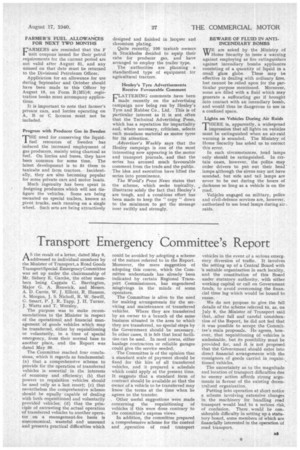Transport Emergency Committee's Report
Page 23

If you've noticed an error in this article please click here to report it so we can fix it.
AS the result of a letter, dated May 9, addressed to individual members by the Minister of Transport, a Road Goods Transport Special EmergencyCommittee was set up under the chairmanship of Mr. Sidney E. Garcke, the other members being Captain C. Barrington, Major G. A. Renwick, and Messrs. A. D. Currie, W. J. Elliott, R. Hanson, A. Morgan, J. S. Nicholl, R. W. Sewill, G. Smart, P. J. R. Tapp, J. H. Turner, J. Watts and T. Worsley.
The purpose was to make recommendations to the Minister in respect of the operational. and financial management of goods vehicles which may be transferred, either by requisitioning or voluntarily, in a time of special emergency, from their normal base to another place, and the Report was dated May 30.
The Committee reached four conclusions, which it regards as fundamental: (a) that a comprehensive scheme to provide for the operation of transferred vehicles is essential in the interests of economy and efficiency; (b) that powers to requisition vehicles should. be used only as a last resort; (c) that nevertheless the comprehensive scheme should be equally capable of dealing with both requisitioned and voluntarily provided vehicles; (d) that the principle of entrusting the actual operation of transferred vehicles to another operator on .a management-fee basis is uneconomical, wasteful and unsound and presents practical difficulties which
could be avoided by adopting a scheme of the nature referred to in the Report. Moreover, the mere suggestion of adopting this course, which the Committee understands has already been indicated by certain Regional Transport Commissioners, has engendered misgivings in the minds of some operators.
The Committee is alive to the need for making arrangements for the servicing and maintenance of transferred vehicles. Where they are transferred by an owner to a branch of the same business situated in the area to which they are transferred, no special steps by the Government should be necessary. In other cases, it is felt that local facilities can be used. In most towns, either haulage contractors or reliable garages could give the service needed.
The Committee is of the opinion that a standard scale of payment should be fixed for the hire of all transferred vehicles, and it prepared a schedule which could apply at the present time. It suggests that a standard form of contract should be available so that the owner of a vehicle to be transferred may know the terms at the time when he agrees to the transfer.
, Other useful suggestions were made concerning the requisitioning of vehicles if this were done contrary to the committee's express views.
In addition, the committee prepared a comprehensive scheme for the control and ,operation of road transport vehicles in the event of a serious emergency diversion of traffic. It involves the setting up of a Central Board with a suitable organization in each locality, and the constitution of this Board under statutory authority, with either working capital or call on Government funds, to avoid overcoming the financial time lag which would be bound to ensue.
We do not propose to give the full details of the scheme referred to, as, on July 9, the Minister of Transport said that, after full and careful consideration of the Report, he did not feel that it was possible to accept the Committee's main proposals. He agrees, however, that requisitioning of vehicles is undesirable, but its possibility must be provided for, and it is not proposed that the GOvernment should enter into direct financial arrangements with the consignors of goods carried in requisitioned vehicles.
The uncertainty as to the magnitude and location of transport difficulties due to enemy action affords strong arguments in favour of the existing decentralized organization.
Putting into operation at short notice a scheme involving extensive changes in the machinery for handling road transport would lead to a serious risk, of confusion. There would be considerable difficulty in setting up a statutory board, some members of which are financially interested in the operation of road transport.




























































